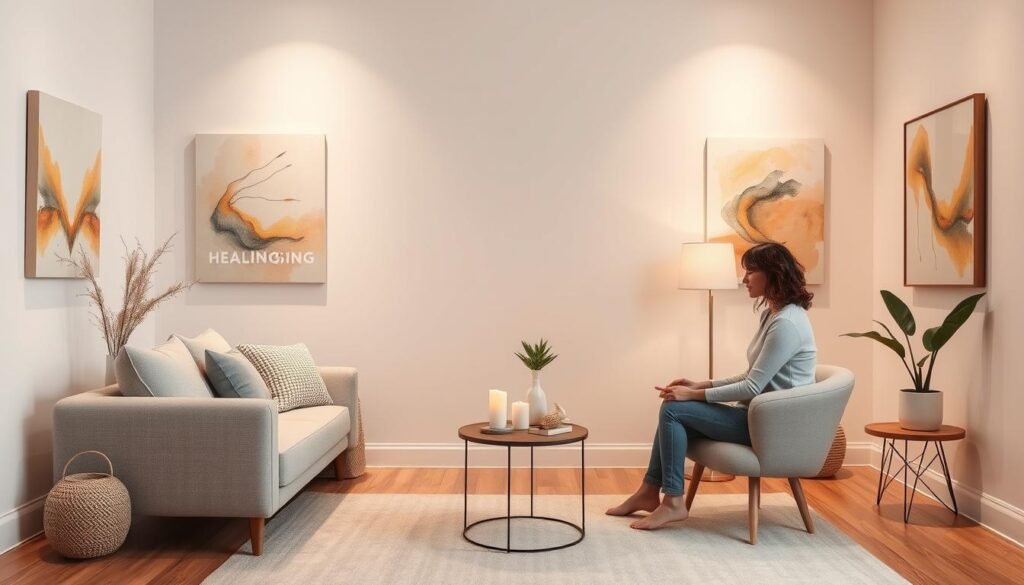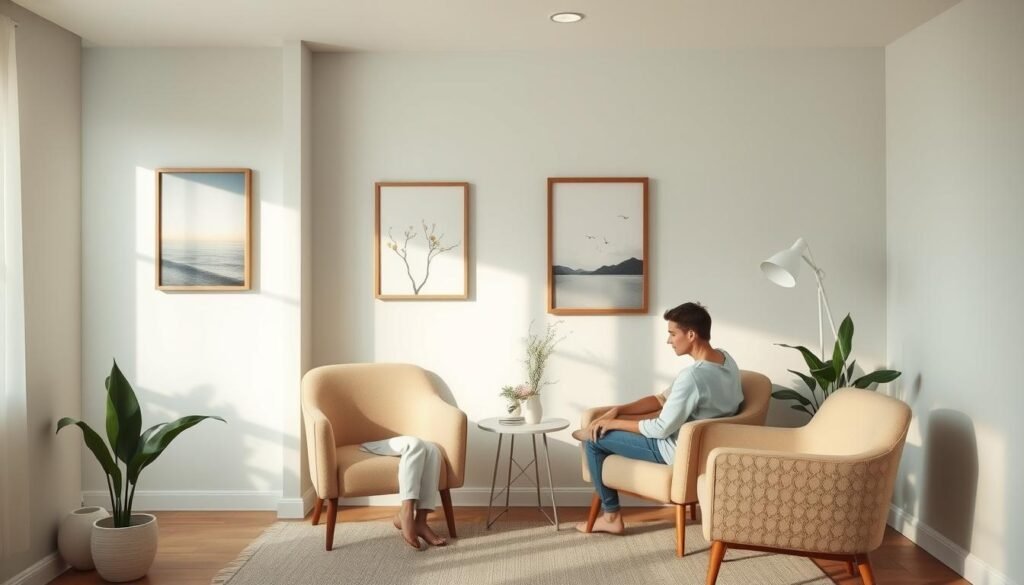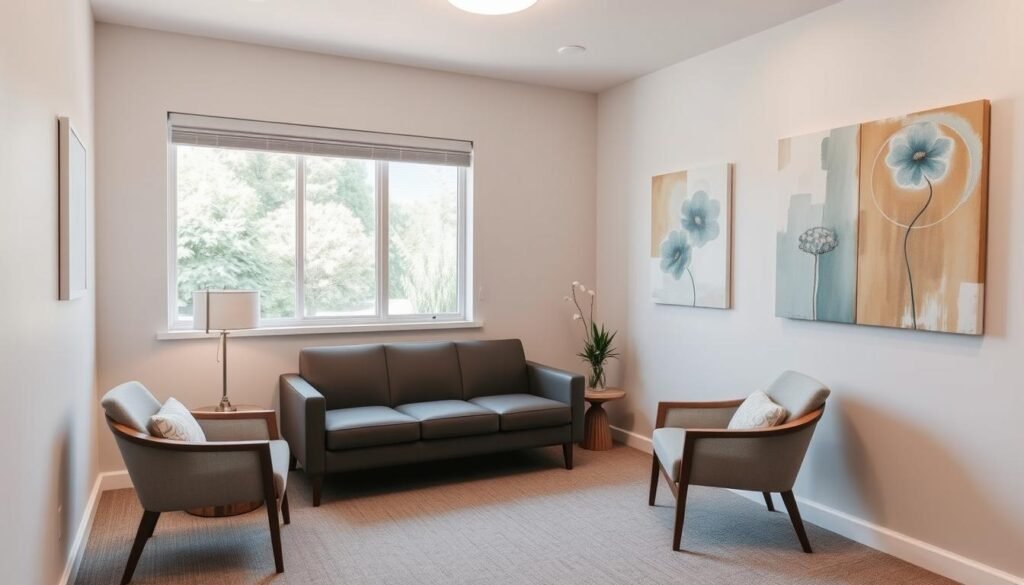The number of U.S. adults facing depression symptoms tripled during the pandemic. This dramatic rise shows a critical truth. Mental health issues, especially depression, not only impact individuals but also put stress on their relationships. This makes Couples Therapy for Depression more vital than ever.
Couples experiencing these issues can gain a lot from Relationship Counseling. It works to better emotional connections and address behaviors stemming from mental health problems. Experts often suggest a comprehensive approach that combines individual and couple therapy. This strategy includes methods like Behavioral Activation, which improves mood and decreases distress, benefiting both individuals and the relationship.
Going forward, we’ll explore how Couples Therapy Mental Health can create stronger partnerships. It does this while helping to relieve depression symptoms.
Key Takeaways
- Depression impacts both individuals and their partners, resulting in emotional disconnection.
- Couples Therapy for Depression provides combined treatment for both partners.
- Some therapeutic methods are Cognitive Behavioral Therapy and Behavior Activation.
- Effective couples therapy enhances both emotional well-being and relationship quality.
- It’s crucial to tackle mental health problems in relationships for overall health.
- A supportive therapy environment enables partners to communicate well and solve conflicts.
Understanding Couples Therapy for Depression
Couples therapy for depression helps partners tackle depressive symptoms impacting their relationship. It looks at how mental health influences a couple’s dynamic. By undergoing relationship counseling, couples learn how their actions affect each other’s emotions. They find ways to support and improve their mental health together.
Definition and Importance
This therapy focuses on improving relationships during tough emotional times. It knows that mental health issues affect both the individual and the relationship. Couples depression counseling shows how deeply connected these aspects are. In therapy, couples can talk freely about their feelings. They work to understand problems and support each other.
How Couples Therapy Differs from Individual Therapy
Couples therapy differs from individual therapy by encouraging partner dialogues. It tackles the couple’s shared issues and experiences. This approach is great for managing depression together as it changes negative interactions. It’s as effective as individual therapy but focuses on fixing relationship problems.
In 12 to 16 sessions, couples learn how to better their relationship. These meetings last 50 minutes. Research shows that distressed couples are more likely to face depression. This makes therapy important for their well-being.
The Effects of Depression on Relationships
Depression can make relationships tough. It leads to problems that both partners face. Knowing these issues helps couples find ways to heal together.
Common Patterns of Relationship Distress
Depression causes certain problems in relationships. Couples might:
- Increased Conflict: Fight more over ongoing issues, feeling upset and bitter.
- Communication Breakdowns: Have trouble sharing thoughts, leading to misunderstandings.
- Emotional Withdrawal: Pull away from each other, losing closeness.
Studies show couples with depression are more likely to split up. Recognizing these problems is the first step to getting help.
Emotional Disconnection and Its Consequences
Feeling disconnected because of depression really affects couples. Mood swings and losing interest can make things worse, hiding the good times. This can lead to:
| Consequences | Description |
|---|---|
| Lack of Intimacy | Less physical and emotional closeness, causing loneliness. |
| Decline in Affection | Fewer signs of love, making partners unhappy. |
| Increased Isolation | Partners pull away, hard to support each other. |
Fixing these issues is key to better therapy for couples. Therapy offers ways to tackle bad patterns and grow closer again.

Benefits of Couples Therapy for Depression
Couples Therapy for Depression offers several advantages for dealing with emotional challenges. It greatly improves communication skills. This allows individuals to share their thoughts and feelings better.
With better communication, partners understand each other more clearly. This leads to fewer misunderstandings and healthier conversations.
Improved Communication Skills
In Depression Therapy for Couples, there’s a big focus on talking freely. It makes a safe space for both partners. They can share concerns without being judged.
This open communication boosts relationship satisfaction. It helps couples understand each other’s feelings and views better.
Enhanced Emotional Connection
As couples talk better, they also feel closer emotionally. Marriage Counseling Depression helps them bond. They feel more empathy and understanding towards each other.
This stronger bond makes both partners feel supported. It fights the loneliness depression often brings.
Strengthened Couple Dynamics
Couples therapy gives partners tools to handle conflicts well. This is especially useful when dealing with depression. They learn how to work together to solve problems.
Investing in Couples Therapy for Depression strengthens the relationship’s foundation. It makes the relationship stronger against stress.

Types of Couples Therapy Approaches
There are different types of therapy for couples, each with unique benefits. Knowing these methods can make therapy for depression more helpful. Let’s look at three main types:
Emotionally Focused Therapy (EFT)
Since the 1980s, Emotionally Focused Therapy has become very popular. It helps partners form strong emotional bonds. It also deals with harmful emotional behaviors. Many couples, about 75%, find their relationships improve with EFT.
The Gottman Method
The Gottman Method was created by Drs. John and Julie Gottman. Their approach uses research to help couples better communicate and get closer. Couples learn to solve problems together. This strengthens their bond and helps manage disagreements. Many find their relationship quality improves with this method.
Behavioral Couples Therapy
Behavioral Couples Therapy focuses on encouraging good behavior. Couples do exercises to understand and connect with each other. This method is great for challenges like unfaithfulness, anger, or money issues. Couples see better ways they interact after this therapy.

| Approach | Focus | Effectiveness |
|---|---|---|
| Emotionally Focused Therapy (EFT) | Secure emotional bonds | 75% success rate |
| The Gottman Method | Communication & intimacy | Strong evidence-based success |
| Behavioral Couples Therapy | Reinforcing positive behaviors | Improves interaction dynamics |
How Couples Therapy Can Help Manage Depression
Couples therapy helps manage depression in relationships. It looks at negative ways partners interact, helping them through emotional challenges. Many couples face depression symptoms that hurt how they connect. Understanding and changing these can improve their relationship.
Changing Negative Interaction Patterns
Criticism, defensiveness, or avoiding feelings can hurt couples. About half of those in therapy face mild to moderate depression. Therapy focuses on fixing bad interaction habits.
Therapists use methods like cognitive-behavioral therapy (CBT). This helps couples talk better, reducing depression and strengthening their bond.
Building Mutual Support
Support between partners is key for tackling depression together. Almost 45% of unhappy wives experience depression, highlighting the need for sharing feelings. Therapy encourages this open exchange.
Partners learn to understand and support each other. This fosters empathy and a stronger emotional connection. It makes them better at handling depression together.
Signs That Couples Therapy is Needed
It’s vital to notice when you might need couples therapy to fix relationship troubles. Many partners face hard times, like bad communication and feeling apart from each other. These problems show up as big changes in how someone acts or what they feel.
Indicators of Relationship Strain
Here are signs that you might need help with your relationship:
- Arguments that keep happening and don’t get resolved.
- Less closeness could mean you’re not connecting well.
- Feeling upset or unsure about your partner.
- Not feeling like partners in everything you do.
- Hiding what you buy or your debts from each other.
- Spending more time apart could mean you’re drifting away.
- Talking less or not enjoying chats like before.
- Thinking about someone else shows needs aren’t being met.
Recognizing the Impact of Individual Mental Health on the Partnership
Mental health issues like anxiety or depression greatly affect relationships. They change how both people interact and feel about each other. Realizing this helps keep the bond strong.
- Big changes, like moving or starting a family, can cause stress.
- Money problems are a big source of tension and mistrust.
- Old unresolved issues need expert advice to move past them.
- About 70% of couples say therapy made things better for them.
- Keeping secrets, whether personal or financial, might hurt trust.
- Doubting each other too much can make you feel distant.
Choosing the Right Couples Therapist
Finding the right couples therapist is crucial for boosting mental health in couples therapy. Many challenges in relationships can be improved with a skilled therapist. The first step is knowing what makes an effective counselor.
Criteria for Effective Couples Counseling
To pick a good therapist, couples should think about a few key points:
- Credentials: Search for therapists who are licensed, like Licensed Marriage and Family Therapists (LMFT) or clinical psychologists. These licenses show they’re well-trained.
- Experience: It’s good to pick someone who has experience with therapy for depression among couples and other problems.
- Therapy Approach: It helps to know if the therapist uses special methods, like Emotionally Focused Therapy (EFT) or the Gottman Method, to fit the couple’s needs.
- Feedback Mechanism: Good therapy needs open talk. Therapists should welcome feedback to improve the therapy process.
Researching Credentials and Approaches
Couples should spend time looking into potential therapists’ qualifications and therapy styles. Getting advice and reading reviews are crucial steps. Here are ways to do it:
- Online Research: Use available resources to check qualifications and read reviews from clients.
- Initial Consultation: An early meeting can help set clear expectations and see if the therapist’s approach fits.
- Insurance Coverage: Check if insurance covers the therapy. Costs can vary a lot so this is important.
- Adaptability: Look at options for meeting in person or online and weigh the pros and cons.
By doing detailed research and talking openly early on, couples can make a wise choice when picking a therapist. The best therapist has the right credentials and connects well with the couple, creating a good space for change and growth.
What to Expect in Couples Therapy Sessions
Couples Therapy for Depression has a clear structure, helping partners heal emotionally. It gives a safe place for both to share feelings with a professional’s help. Knowing the session setup and goal importance can boost therapy’s impact.
Typical Session Structure
Therapists begin sessions by checking in. Partners talk about their feelings and recent events. This makes sure everyone feels heard. The therapist then picks key issues to work on.
- Check-in: Both partners discuss their feelings and thoughts since the last session.
- Issue Identification: Couples pinpoint topics or conflicts that need addressing.
- Therapeutic Techniques: The therapist employs methods tailored to the couple’s needs, such as the Gottman Method or Emotion-Focused Therapy.
- Homework Assignments: Partners may receive tasks aimed at reinforcing skills learned in therapy, fostering continued growth outside of sessions.
Goal Setting and Progress Tracking
Setting goals is key in Marriage Counseling Depression. It helps couples see their progress clearly. Together, they define success to stay motivated and focused on their goals.
| Goal Type | Example Goal | Progress Indicators |
|---|---|---|
| Communication | Improve active listening skills | Frequency of using reflective listening techniques |
| Conflict Resolution | Resolve disputes without escalation | Number of issues addressed calmly per week |
| Emotional Connection | Spend quality time together weekly | Consistency in date nights or shared activities |
The therapist regularly checks progress, offering feedback. This team approach raises the chances of success in Therapy for Depression. It highlights the benefits of working together in therapy.
Conclusion
Couples Therapy for Depression is a key tool for couples facing depression and problems in their relationship. It creates a space for open talk, allowing both to share their feelings and support each other’s mental health. This type of counseling strengthens both individual happiness and the relationship as a whole.
It’s important for couples to notice when they need therapy and to find the right therapist. Going to therapy together can make the relationship stronger. Studies show that while Couples Therapy is often more effective than going alone, more research is required to prove this fully.
Choosing to go through Couples Therapy for Depression can lead to better mental health and a tighter bond. This choice shows a commitment to each other and their future together.